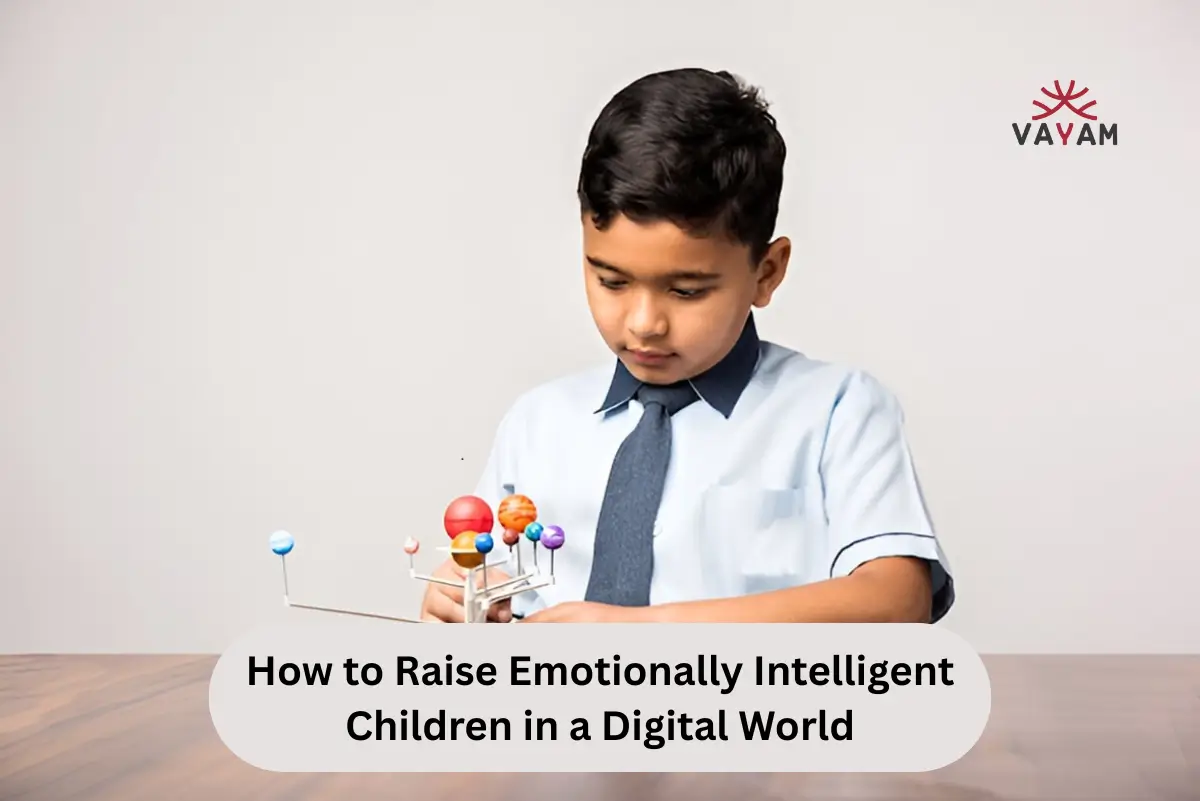
In today’s fast-paced digital world, raising emotionally intelligent children is more crucial than ever. Emotional intelligence (EI) refers to the ability to understand and manage one’s own emotions while also empathizing with others. This skill is vital for children as they navigate social interactions and the complexities of the digital landscape.
In this blog, we’ll explore the essence of emotional intelligence, discuss the unique challenges posed by the digital age, and provide practical strategies for fostering EI in children.
Understanding Emotional Intelligence
What is Emotional Intelligence?
Emotional intelligence is often broken down into five key components: self-awareness, self-regulation, motivation, empathy, and social skills. Children with high EI can recognize their feelings, control their impulses, and understand the emotions of those around them.
Why is Emotional Intelligence Important?
Research shows that children with strong emotional intelligence tend to perform better academically, have healthier relationships, and display greater resilience against stress. As they grow, these skills will serve them well in both personal and professional environments.
The Challenges of the Digital Age
Digital Distractions
The rise of smartphones and tablets has introduced an array of distractions. Children are often more focused on screens than on the people around them. This can hinder their ability to develop social skills and emotional intelligence.
Social Media and Self-Esteem
Social media platforms can distort reality, making it easy for children to compare themselves to others. This can lead to issues with self-esteem and anxiety, as they may feel inadequate compared to the curated lives portrayed online.
Cyberbullying
The anonymity of the internet can lead to increased instances of bullying. Children who experience cyberbullying may struggle with their emotions and self-worth, making it harder for them to build healthy relationships.
Strategies for Raising Emotionally Intelligent Children
Modeling Emotional Intelligence
Children learn a lot through observation. By modeling emotionally intelligent behavior, parents can teach their children how to express emotions appropriately. Share your feelings, discuss your day, and express empathy towards others.
Encouraging Open Communication
Create an environment where children feel safe to express their emotions. Ask open-ended questions about their day and feelings, and listen actively. This fosters trust and encourages them to articulate their feelings.
Teaching Empathy
Empathy is a cornerstone of emotional intelligence. Engage your children in discussions about how others might feel in different situations. Use stories and scenarios to help them understand diverse perspectives.
Setting Boundaries with Technology
Establish clear rules regarding technology use. Encourage device-free times, especially during family meals or conversations. This helps children learn to value face-to-face interactions.
Promoting Mindfulness
Mindfulness practices can enhance emotional regulation. Simple techniques, such as deep breathing or meditation, can help children manage their emotions, particularly in stressful situations.

Read More
Why Every NGO Needs a CSR Partnership Strategy in 2025
One Girl One Future Here’s How You Can Be Part of the Change in 2025
Activities to Enhance Emotional Intelligence
Emotion Recognition Games
Use games that focus on identifying emotions. Flashcards showing different facial expressions can help children learn to recognize and label feelings.
Role-Playing Scenarios
Create role-playing exercises to explore various social situations. This can help children practice empathy and develop problem-solving skills.
Mindfulness Practices
Encourage activities like yoga or guided meditations. These practices can help children become more in tune with their emotions and improve their overall well-being.
FAQs
What are the signs of emotional intelligence in children?
Signs of emotional intelligence in children include the ability to express their emotions appropriately, show empathy towards others, recognize others’ feelings, and adapt their behavior based on social cues.
How can I teach my child empathy?
Teaching empathy can involve discussing feelings, encouraging them to consider others’ perspectives, and providing opportunities for community service or helping others.
What role does technology play in emotional development?
While technology can serve as a tool for learning, excessive screen time can hinder emotional development by reducing face-to-face interactions and real-world experiences.
How can parents’ model emotional intelligence?
Parents can model EI by openly discussing their emotions, demonstrating empathy, managing stress effectively, and engaging in active listening with their children.
Are there apps for building emotional intelligence?
Yes, several apps focus on emotional intelligence, offering games and activities designed to help children recognize and manage their emotions.
Conclusion
Raising emotionally intelligent children in a digital world requires intentionality and effort. By modeling emotional intelligence, encouraging open communication, and setting boundaries with technology, parents can equip their children with the skills they need to thrive emotionally and socially.
As we navigate this digital age, fostering emotional intelligence will not only benefit our children but also contribute to a more empathetic and understanding society.
